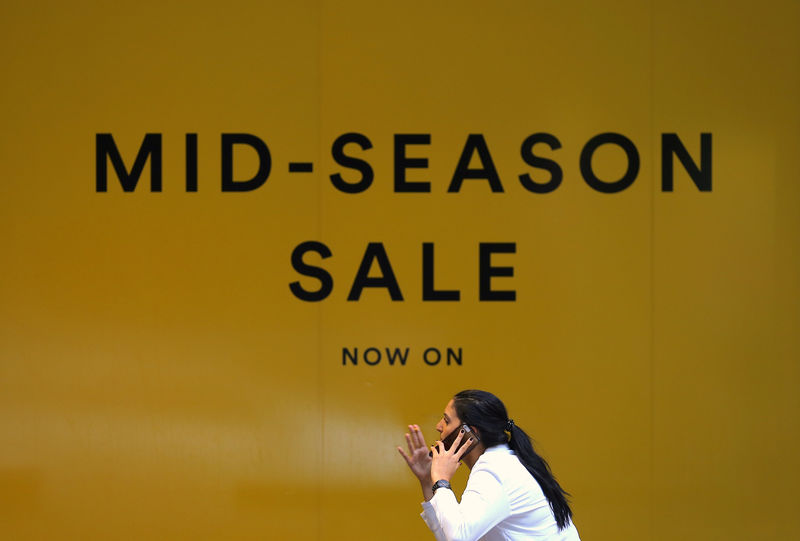By Swati Pandey
SYDNEY (Reuters) - A fierce price war among retailers is threatening to keep a lid on improving inflation in Australia, compounding the problems of policymakers struggling to support still-weak domestic demand.
An uptick in consumer inflation has lowered the chance of another rate cut this year, but competition from global retailers such as Amazon.com Inc (O:AMZN) is set to keep prices under pressure - good news for shoppers but worrying for the central bank.
The country's biggest retailers are suffering from a long spell of deflation that is unlikely to subside soon. Amazon and German supermarket chain Kaufland want to fortify their global presence Down Under and will join recent entrants such as H&M (ST:HMb), Uniqlo (T:9983) and Aldi [ALDIEI.UL].
The Reserve Bank of Australia (RBA) said on Friday that "heightened competitive pressures" in the retail sector were among key factors keeping inflation subdued.
"The arrival of further new foreign retailers will be an important influence on final retail prices over the next few years," the RBA said in its quarterly statement on monetary policy in which it expects underlying inflation may only fully return to its 2-3 percent target band by mid-2019.
Worried about deflation risks, the RBA slashed rates twice last year to a record low 1.50 percent. It is widely expected to hold rates until mid-2018 but subdued consumer prices could become a trigger for a move lower, and push the Australian dollar weaker.
"While consumers will benefit from lower prices, ongoing weakness in retail inflation is a key factor weighing on the broader inflation outlook," said ANZ economist Jo Masters.
There was some relief headline consumer prices rose in the first quarter, taking the annual pace to its fastest since 2014 at 2.1 percent. But five of 11 sectors - about 30 percent of the CPI basket - saw price falls. Prices for women's clothing, for example, were at their cheapest on record.
A study by Capital Economics shows price increase in what it classifies as 'luxuries' - clothing, alcohol and recreation - halved to 0.6 percent from 1.2 since the start of last year. Inflation in 'essentials' - food, electricity and insurance - accelerated to 3.4 percent from 1 percent.
"In other words, it now costs much more to live, but not much more to have fun," said economist Paul Dales, adding that this situation was hitting household spending on discretionary items. "It implies that consumption growth will be a little bit weaker."
Clothing and homeware prices have fallen due to cut-throat competition among major retailers, which only intensified with the arrival of foreign chains to Australia.
While there are few details on how Amazon will position itself, the retail giant's expected entry this year will worsen the pain of a retail industry that has been largely insulated by a housing boom and pick-up in global growth, analysts said.
Jefferies expects Amazon to capture between A$3 billion to A$8 billion ($2.25-$6 billion) of sales in Australia - about 30 percent of current online retail sales.
WHO MOVED MY CHEESE?
Amazon will "eat all our breakfasts, lunches and dinners", said Wesfarmers group (AX:WES) managing director, Richard Goyder last year, although he has since softened his stance.
"I'm less worried about Amazon in food," he said, after the company's quarterly sales results last month which showed its Coles supermarket chain has suffered 24 consecutive quarters of price deflation. "There are plenty of disrupters and plenty of competition around at the moment."
Gerry Harvey, founder of Australia's top electronics and homewares retailer Harvey Norman (AX:HVN), has vowed to "match or beat" Amazon's aggressive pricing.
Australian retailers are being forced to change their business models but four major firms going into voluntary administration in the first two months of the year highlights the deepening crisis.
Not surprisingly, the sector has been shedding jobs, with more workers lost in the year to November 2016 than any other industry.
"Foreign retailers are attracted by relatively high margins in Australia and will continue to enter the market as long as that additional margin is on offer," said Masters of ANZ.
So far, only 16 percent of the world's top 250 retailers have a physical presence in Australia, according to Deloitte.
Average five-year operating margin for Harvey Norman was 18.7 percent, and for Wesfarmers 7.6 percent, according to Thomson Reuters data. That compares with 6.1 percent for Amazon and 5.3 percent for Best Buy (N:BBY).
For a graphic on Australian inflation, wages growth, click http://fingfx.thomsonreuters.com/gfx/rngs/AUSTRALIA-ECONOMY-INFLATION/010040X41YW/australia-cpi.jpg
